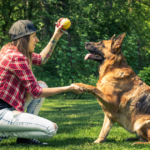Dog Trainer Certification Programs and Training
While some will argue that the easiest way to understand and learn about dogs is to own one and observe canine behavior, this is just part of the equation. Having a dog not only improves your life but teaches you a great deal about how dogs think and act in a variety of different situations. Certification programs also teach you the many responsibilities that come with owning a dog and even the characteristics of certain breeds (such as husky or pitbull, etc.). Another aspect of study includes helping at animal shelters, rescue agencies, and kennels, including the ASPCA. This not only helps the animals in your community, it also gives you real life experience with dogs. If you choose to go the academic route as well and enrich yourself with courses (which is highly recommended), these can be taken through many organizations, technical schools and community colleges.
These courses may offer rudimentary dog training or you may specialize and focus on certain areas. Some highly qualified dog handlers may train service dogs to help the disabled, the military, law enforcement or other governmental agencies. Canine courses generally include a large degree of hands-on work with dogs to learn the appropriate skills and how to handle different types of dogs and in different situations. Anyone can take these courses, they are completely open to the public other than paying a fee there are no other requirements. It is always a great idea to acquire a degree and there are a few degrees available specific to dog training. These accredited courses focus on cynology (the specific study of canines instead of dog training in particular). It is definitely worthwhile to expand your scope of study. Other than canine training for law enforcement and military applications, most dog training is voluntary. Trainers do not require certification but a certificate from associations such as the Certified Professional Dog Trainer- Knowledge Assessed (CPDT-KA) offered through the Certification Council for Professional Dog Trainers, will greatly increase your ability to gain employment. The International Association of Canine Professionals (IACP) also offers a Certified Dog Trainer certification (IACP-CDT). Applicants for this certification must have at least two years of experience in dog training and at least six months of membership with the IACP.
Another great way to promote your career is to start your own dog training business. Additional degree courses that can be beneficial are courses that hone business skills including: sales, marketing and management, these attributes will help you gain and retain clients. You can also specialize in new, trending or developing fields of canine care such as walking, animal therapy, grooming or working with performance, hunting or show dogs. This will expand your reach and help attract new business. Working with especially small, large, problem or disabled dogs will also open new doors.





